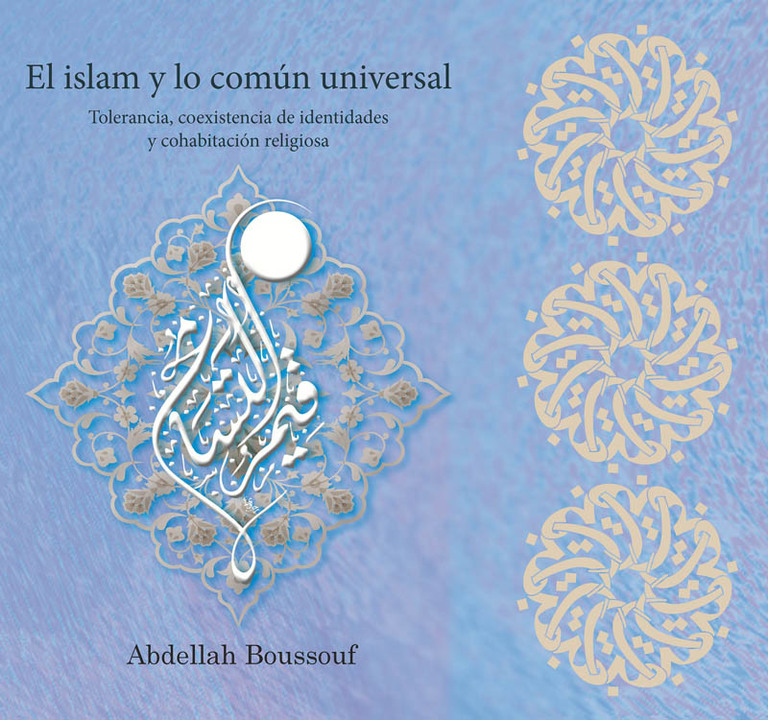Books and publications
Index / Activities / Books and publications / Islam and the Universally Shared: Co-existing identities and religions
Islam and the Universally Shared: Co-existing identities and religions
February 12, 20187:30 p.m.
MADRID
Casa Árabe Auditorium (at Calle Alcalá, 62).
7:30 p.m.
Free entry until the event’s capacity is reached.
Abdallah Boussouf, Secretary General of the Council of the Moroccan Community Abroad (CCME) and author of this work, is presenting this book at Casa Árabe’s headquarters in Madrid.
The event will be presented by Pedro Martínez-Avial, the General Director of Casa Árabe.
In the book, Abdallah Boussouf uses a series of essays with a historical perspective to recover the essential values of Islam from its very origins, placing the emphasis on ideological and religious pluralism, and intercultural co-existence, typical of societies where Islam predominates. The principles of co-existence and tolerance of diversity comprise an Islamic legacy which is especially important to highlight in our day, as a counterpoint to the widespread portrayal of Islam associated with violence and the prejudices which have led to commonplace Islamophobia. In “El islam y el común universal” (“Islam and the Universally Shared,” published by Ediciones Panteón, 2017 in France, and by Diwan 2018 in Spain), Boussouf defends moderate Islam, tolerance and peaceful religious co-existence.
The book’s author is also the Secretary General of the Council of the Moroccan Community Abroad (CCME) and a historian whose doctoral thesis focused on relations in the Mediterranean Basin in the thirteenth century. He was a European Commission expert in the program “A Soul for Europe” (1997-2003). He presided over the commission to form the French Council for Muslim Worship (CFCM) and was elected Vice-President of that council in 2005. He was a founder of the Euro-Islamic Center for Culture and Dialogue, with headquarters in Charleroi, Belgium.
The Council of the Moroccan Community Abroad (CCME) is an institution for consultation and prospecting with administrative and financial independence that is responsible for drafting reports and studies on migration in general and Moroccan immigration around the world in particular. It is also responsible for tracking and evaluating the Kingdom’s policies to adapt them better to the needs of the Moroccan diaspora, thereby ensuring their rights while making it possible for them to take part in the country’s political, economic, cultural and social development.
In the book, Abdallah Boussouf uses a series of essays with a historical perspective to recover the essential values of Islam from its very origins, placing the emphasis on ideological and religious pluralism, and intercultural co-existence, typical of societies where Islam predominates. The principles of co-existence and tolerance of diversity comprise an Islamic legacy which is especially important to highlight in our day, as a counterpoint to the widespread portrayal of Islam associated with violence and the prejudices which have led to commonplace Islamophobia. In “El islam y el común universal” (“Islam and the Universally Shared,” published by Ediciones Panteón, 2017 in France, and by Diwan 2018 in Spain), Boussouf defends moderate Islam, tolerance and peaceful religious co-existence.
The book’s author is also the Secretary General of the Council of the Moroccan Community Abroad (CCME) and a historian whose doctoral thesis focused on relations in the Mediterranean Basin in the thirteenth century. He was a European Commission expert in the program “A Soul for Europe” (1997-2003). He presided over the commission to form the French Council for Muslim Worship (CFCM) and was elected Vice-President of that council in 2005. He was a founder of the Euro-Islamic Center for Culture and Dialogue, with headquarters in Charleroi, Belgium.
The Council of the Moroccan Community Abroad (CCME) is an institution for consultation and prospecting with administrative and financial independence that is responsible for drafting reports and studies on migration in general and Moroccan immigration around the world in particular. It is also responsible for tracking and evaluating the Kingdom’s policies to adapt them better to the needs of the Moroccan diaspora, thereby ensuring their rights while making it possible for them to take part in the country’s political, economic, cultural and social development.

